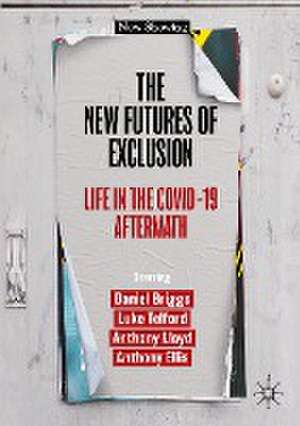The New Futures of Exclusion: Life in the Covid-19 Aftermath
Autor Daniel Briggs, Luke Telford, Anthony Lloyd, Anthony Ellisen Limba Engleză Paperback – dec 2023
Preț: 204.97 lei
Nou
Puncte Express: 307
Preț estimativ în valută:
39.23€ • 40.80$ • 32.38£
39.23€ • 40.80$ • 32.38£
Carte disponibilă
Livrare economică 22 martie-05 aprilie
Preluare comenzi: 021 569.72.76
Specificații
ISBN-13: 9783031418655
ISBN-10: 3031418654
Pagini: 198
Ilustrații: XVII, 198 p. 7 illus., 2 illus. in color.
Dimensiuni: 148 x 210 x 17 mm
Greutate: 0.26 kg
Ediția:1st ed. 2023
Editura: Springer International Publishing
Colecția Palgrave Macmillan
Locul publicării:Cham, Switzerland
ISBN-10: 3031418654
Pagini: 198
Ilustrații: XVII, 198 p. 7 illus., 2 illus. in color.
Dimensiuni: 148 x 210 x 17 mm
Greutate: 0.26 kg
Ediția:1st ed. 2023
Editura: Springer International Publishing
Colecția Palgrave Macmillan
Locul publicării:Cham, Switzerland
Cuprins
Introduction: The story so far.- 1 Freedom withdrawals and the trade-off for compliance.- 2 Harmalogical pharmacology and the Covid-19 vaccine.- 3 Technocratic feudalism and the new surveillance governance.- 4 Digital apartheids and the ‘Other’.- 5 Asymptomatic freedom, resistance and the ‘anti-vaxxers’.- 6 Heavy hands and iron fists against high social fevers.- 7 The new futures of exclusion.
Notă biografică
Daniel Briggs is Professor of Criminology at Northumbria University, UK.
Luke Telford is Lecturer in Criminal Justice & Social Policy at the University of York, UK.
Anthony Lloyd is Associate Professor in Criminology and Sociology at Teesside University, UK.
Anthony Ellis is Associate Professor in Criminology at the University of Lincoln, UK.
Luke Telford is Lecturer in Criminal Justice & Social Policy at the University of York, UK.
Anthony Lloyd is Associate Professor in Criminology and Sociology at Teesside University, UK.
Anthony Ellis is Associate Professor in Criminology at the University of Lincoln, UK.
Textul de pe ultima copertă
"This book is a fundamental contribution to the academic literature on the Covid-19 pandemic, offering a much-needed critical counterbalancing to the orthodox view. But, even more importantly, it is a dramatic appeal: as much as we all just want to move on, we need to collectively confront the global trauma of 2020-2022, as difficult as it may be, or we will pay an even higher price down the road.”
- Thomas Fazi, Journalist, and author of The Covid Consensus
“A compelling critique of pandemic authoritarianism.”
- Lee Jones, Professor of Political Economy and International Relations, Queen Mary University of London
Based upon global data and following on from Lockdown: Social Harm in the COVID-19 Era, this book discusses the rise of surveillance capitalism and new forms of control and exclusion throughout the Covid-19 pandemic. It particularly addresses the use of vaccine passports, mandates and the new forms of capital extraction andpolitical control that emerged throughout the pandemic. The book also explicates how the ‘vaccine hesitant’ became marginalized in both mainstream discourse and through regulatory interventions. Whilst the book addresses the wider political economy within which so-called ‘anti-vaxxers’ were ostracized, it also explores the complex nature of their sentiments. The book closes by considering The New Futures of Exclusion, outlining the forms of surveillance and control that may be implemented in the future particularly in light of the challenges brought by global warming and the energy transition. It is a broadly accessible text, particularly appealing to policymakers, general readers and academics in sociology, political sociology, politics, human geography, political economy, criminology, social policy, psychology, history, and infectious diseases and medicine.Daniel Briggs is Professor of Criminology at Northumbria University, UK. Luke Telford is Lecturer in Criminal Justice & Social Policy at the University of York, UK.
Anthony Lloyd is Associate Professor in Criminology and Sociology at Teesside University, UK.
Anthony Ellis is Associate Professor in Criminology at the University of Lincoln, UK.
“A compelling critique of pandemic authoritarianism.”
- Lee Jones, Professor of Political Economy and International Relations, Queen Mary University of London
Based upon global data and following on from Lockdown: Social Harm in the COVID-19 Era, this book discusses the rise of surveillance capitalism and new forms of control and exclusion throughout the Covid-19 pandemic. It particularly addresses the use of vaccine passports, mandates and the new forms of capital extraction andpolitical control that emerged throughout the pandemic. The book also explicates how the ‘vaccine hesitant’ became marginalized in both mainstream discourse and through regulatory interventions. Whilst the book addresses the wider political economy within which so-called ‘anti-vaxxers’ were ostracized, it also explores the complex nature of their sentiments. The book closes by considering The New Futures of Exclusion, outlining the forms of surveillance and control that may be implemented in the future particularly in light of the challenges brought by global warming and the energy transition. It is a broadly accessible text, particularly appealing to policymakers, general readers and academics in sociology, political sociology, politics, human geography, political economy, criminology, social policy, psychology, history, and infectious diseases and medicine.Daniel Briggs is Professor of Criminology at Northumbria University, UK. Luke Telford is Lecturer in Criminal Justice & Social Policy at the University of York, UK.
Anthony Lloyd is Associate Professor in Criminology and Sociology at Teesside University, UK.
Anthony Ellis is Associate Professor in Criminology at the University of Lincoln, UK.
Caracteristici
Argues that the pandemic advanced pre-existing forms of digital surveillance in society Critically explores the complexities of the vaccine hesitant position Draws on new data from the Global South, Europe, and the Americas
